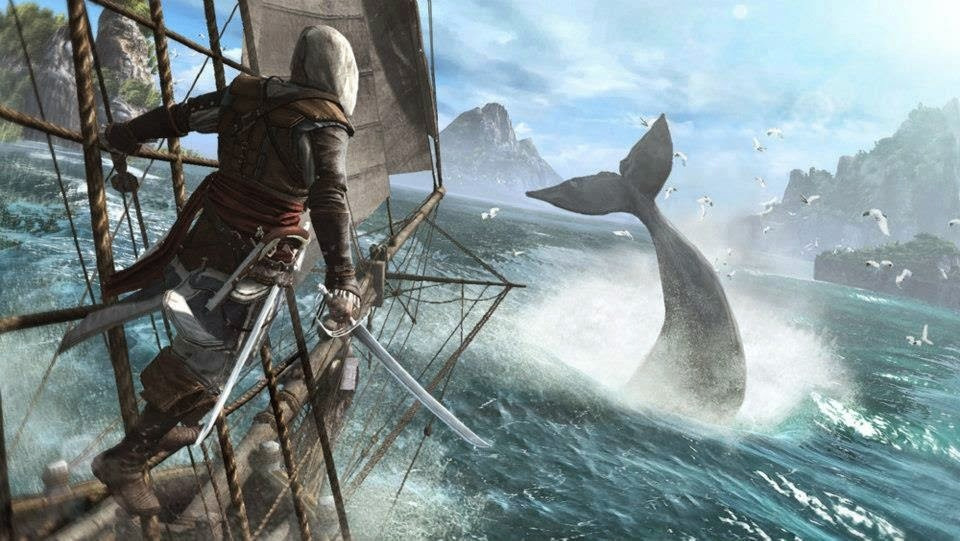Assassin's Creed IV: Black Flag Review

Assassin’s Creed IV: Black Flag gets off to a quick start, turning the series’ longstanding Assassin vs. Templar ideals on their head before giving the player their own ship and setting them loose in the open oceans of the Caribbean. Filling the shoes of roguish pirate Edward Kenway (grandfather to Assassin's Creed III protagonist Connor), players are given free reign to explore most of the game’s world and its myriad systems right from the beginning.
Black Flag, like Rockstar’s Red Dead Redemption before it, is the rare open world game with focus. Pulling equal inspiration from Rockstar’s wild west fantasy and the oceans of Nintendo’s classic The Legend of Zelda: The Wind Waker, nearly every design element, gameplay system, and aesthetic decision unite together to create the most impressive realization of the childhood pirate fantasy that the medium has yet seen.
The satisfying naval combat from ACIII returns, this time as the core of the experience rather than a side mission. Upgrading Edward’s ship, the Jackdaw, is a game-long endeavor that sees players scouring every inch of the game’s oceans and islands for the resources and funds needed to give them an edge in the most challenging battles in the series. A vastly improved user-interface makes navigating violent storms and taking down an armed armada as effortless as driving down a street in Grand Theft Auto V, while the new spyglass function allows players to easily see what plunder awaits them on an enemy ship or a nearby island.
Assassin’s Creed
has long been a very goal-oriented open world experience. Although this
has had the positive effect of constantly providing tangible motivation
and rewards, it has also had the unfortunate tendency of making
Ubisoft’s lovingly rendered worlds feel static when put next to the more
organic, freewheeling approach employed by competitors like Grand Theft Auto V.
The treacherous and unpredictable ocean of Black Flag solves this problem in grand fashion. With weather that can turn from picture perfect to disaster movie in the span of a few minutes, the game’s incredible ocean simulation adds just the right amount of unpredictability to exploration and combat. Merging this impressive technology with engaging new content like shark and whale hunting and survival horror tinged shipwreck diving sees Black Flag striking the perfect balance between its goal-focused heritage and the more emergent style of gameplay that has become prevalent over the past few years.
If Black Flag stands as one of the most ambitious and distinctive open world experiences around while out at sea, it loses its footing a bit when the adventure goes ashore. Most missions for the first third of the game consist of the trailing and eavesdropping varieties and present the series’ mechanics at their worst. Generous checkpoints help soften the blow, but one can’t shake the feeling that it is time for a fundamental rethink of the series’ core mission types and mechanics. Climbing and melee combat provide some satisfaction, but Edward unintentionally sticks to surfaces more often than any Assassin before him and his attacks can feel somewhat stilted.
Even if this isn’t the entry that fixes these legacy issues, the game does benefit from a keen eye for working within these constraints. Edward’s inventory has been simplified, focusing on only the most useful arsenal from the previous game. Liberal hiding places make stealth a more viable option than it has been in the past and the new blowgun tool is the most versatile addition to the stealth toolbox since Brotherhood’s crossbow. A range of elements from Ubisoft’s excellent Far Cry 3 have been lifted wholesale, from its engaging hunting and crafting systems to its useful ability to mark hostile targets. Even the map has been ripped straight from that game and Black Flag is all the better for it.
Following the flat Assassin’s Creed: Revelations and the bold but disjointed Assassin’s Creed III, Black Flag has a lot to prove. It’s no small feat, then, that the game rises to the challenge with no shortage of swagger and charm, effortlessly reversing the series’ downward trend and casting its future in the brightest light it’s enjoyed in years. Assassin’s Creed IV: Black Flag is an unpredictable and lavish open world game with far more to love than loathe and is deserving of your time whether you are a longtime fan of the series or this is your first time taking the plunge.
8.5 / 10
